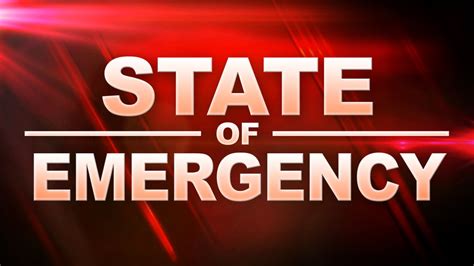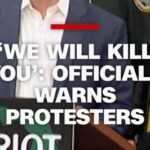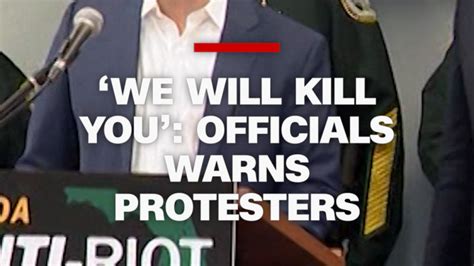
Missouri Governor Mike Parson activated the National Guard and declared a state of emergency on Monday in anticipation of potential unrest following a court decision expected this week in the ongoing case of Bailey v. City of St. Louis, a lawsuit challenging municipal funding of police.
JEFFERSON CITY, Mo. – Missouri Governor Mike Parson has activated the Missouri National Guard and declared a state of emergency, citing concerns about potential civil unrest following a forthcoming court ruling related to police funding in St. Louis. The move comes ahead of a decision expected this week in Bailey v. City of St. Louis, a lawsuit that challenges the legality of the city’s current system of funding its police department.
Governor Parson’s office announced the decision Monday, stating the action was taken “out of an abundance of caution” to ensure public safety and protect property. “We are taking proactive steps to ensure the safety and security of all Missourians,” Parson said in a statement. “Activating the National Guard will provide additional resources to support local law enforcement and protect our communities.”
The lawsuit, Bailey v. City of St. Louis, centers on the argument that the city’s method of allocating funds to the police department violates state law. Plaintiffs in the case contend that St. Louis is not providing adequate funding for its police force, leading to staffing shortages and hindering the department’s ability to effectively address crime. The core of the dispute revolves around the interpretation of a state statute that mandates a certain level of financial support for law enforcement agencies.
The specific details of the state of emergency declaration include provisions that allow the National Guard to assist local law enforcement with maintaining order, protecting critical infrastructure, and responding to any potential disturbances. The governor’s office has emphasized that the National Guard will only be deployed if requested by local authorities and will operate under the direction of the Missouri State Highway Patrol. The activation is intended to supplement the capabilities of existing law enforcement agencies and provide additional resources in the event of widespread unrest.
The pending court decision has generated considerable tension in St. Louis, with various community groups and activists planning demonstrations and protests regardless of the outcome. Concerns have been raised about the potential for these gatherings to escalate into violence or property damage, prompting the governor’s decision to activate the National Guard.
The Missouri National Guard is a component of the Missouri Army National Guard and the Missouri Air National Guard. Its members are trained to respond to a wide range of emergencies, including natural disasters, civil disturbances, and homeland security threats. The Guard has previously been deployed to assist with security during periods of heightened tension or unrest.
State law requires the governor to declare a state of emergency before activating the National Guard for law enforcement purposes. The declaration allows the state to access additional resources and funding to support the deployment. It also provides legal protections for National Guard members who are called upon to perform law enforcement duties.
The exact number of National Guard members activated has not been publicly disclosed. However, the governor’s office has indicated that a sufficient number of troops will be available to meet the needs of local law enforcement agencies. The deployment will be coordinated with the Missouri State Highway Patrol, which will serve as the lead agency for managing any potential unrest.
The Bailey v. City of St. Louis lawsuit has been closely watched by law enforcement officials, city leaders, and community members. The outcome of the case could have significant implications for the funding of police departments in St. Louis and other cities throughout Missouri. A ruling in favor of the plaintiffs could force St. Louis to increase its funding for the police department, while a ruling in favor of the city could maintain the status quo.
Opponents of the lawsuit argue that the current funding system is adequate and that the city has made significant investments in law enforcement in recent years. They also contend that increasing police funding is not the only solution to addressing crime and that other factors, such as poverty, unemployment, and lack of educational opportunities, also play a significant role.
Supporters of the lawsuit argue that the current funding system is inadequate and that the police department is understaffed and under-resourced. They also contend that increasing police funding is essential to ensuring public safety and reducing crime.
The potential for unrest in St. Louis is further complicated by the city’s history of racial tensions and police misconduct. In recent years, St. Louis has experienced several high-profile incidents of police brutality and racial profiling, which have sparked protests and calls for police reform. The pending court decision has the potential to reignite these tensions and lead to further unrest.
The governor’s decision to activate the National Guard has been met with mixed reactions. Some have praised the move as a necessary step to ensure public safety, while others have criticized it as an overreaction that could escalate tensions and further inflame the situation. Civil rights groups have expressed concerns about the potential for the National Guard to use excessive force against protesters.
The Missouri State Highway Patrol has been working with local law enforcement agencies to develop contingency plans for managing potential unrest. These plans include strategies for crowd control, traffic management, and communication with protesters. The Highway Patrol has also been coordinating with community leaders and activists to encourage peaceful demonstrations and discourage violence.
The situation in St. Louis remains fluid and unpredictable. The outcome of the Bailey v. City of St. Louis lawsuit will likely have a significant impact on the city’s future. The governor’s decision to activate the National Guard underscores the seriousness of the situation and the potential for unrest.
The underlying issues fueling the tension extend beyond the immediate court case. St. Louis, like many urban centers, grapples with complex challenges including socioeconomic disparities, historical inequalities, and deep-seated mistrust between communities and law enforcement. The debate over police funding is often a proxy for broader discussions about social justice, equity, and the role of government in addressing systemic problems. The resolution of the Bailey v. City of St. Louis case, regardless of the outcome, will not automatically resolve these underlying issues. Continued dialogue, community engagement, and comprehensive strategies are essential to fostering lasting peace and stability.
The timing of the decision is also notable. The activation of the National Guard ahead of the court ruling suggests a high level of concern within the governor’s office about the potential for widespread and sustained unrest. It also sends a message, whether intentional or not, to protesters and community members. Some may interpret it as a sign of strength and resolve, while others may view it as an act of intimidation or an attempt to suppress dissent. The perception of the National Guard’s presence will likely influence the behavior of protesters and the overall atmosphere in the city.
The legal challenges surrounding police funding are not unique to St. Louis. Many cities across the United States face similar debates about the appropriate level of investment in law enforcement and the allocation of resources within police departments. The outcome of the Bailey v. City of St. Louis case could serve as a precedent for other cities facing similar challenges. It could also influence the broader national conversation about police reform and the role of law enforcement in society.
The response from the St. Louis community has been varied. Some residents express gratitude for the proactive measures taken to ensure safety and order. Others express fear and apprehension, worried about the potential for escalated conflict and the militarization of their city. Community organizations are working to provide support and resources to residents, emphasizing the importance of peaceful expression and community solidarity. Open lines of communication between law enforcement, community leaders, and residents are crucial for navigating this tense period and preventing misunderstandings or escalations.
Beyond the immediate concerns of potential unrest, the Bailey v. City of St. Louis case raises fundamental questions about the relationship between state and local governments. The lawsuit hinges on the interpretation of a state statute, highlighting the power of the state government to regulate and oversee the actions of local municipalities. The case underscores the importance of clear and consistent laws governing the funding and operation of essential services, such as law enforcement. It also highlights the potential for legal challenges to shape public policy and influence the allocation of resources.
The role of the media in covering the unfolding events in St. Louis is also critical. Responsible journalism is essential for providing accurate and unbiased information to the public, fostering informed dialogue, and holding government officials accountable. Media outlets must carefully balance the need to report on potential threats to public safety with the responsibility to avoid sensationalizing the situation or contributing to fear and division. Accurate reporting, diverse perspectives, and thoughtful analysis are crucial for helping the public understand the complexities of the situation and make informed decisions.
The long-term implications of the Bailey v. City of St. Louis case and the governor’s response extend beyond the immediate concerns of public safety and police funding. The events in St. Louis will likely shape the political landscape of the city and the state for years to come. They could influence future elections, policy debates, and the relationship between communities and law enforcement. The lessons learned from this experience will be valuable for other cities and states facing similar challenges.
The activation of the National Guard also raises questions about the appropriate use of military resources in domestic law enforcement. While the National Guard can provide valuable support to local law enforcement agencies in times of crisis, concerns have been raised about the potential for the militarization of police and the erosion of civil liberties. It is essential to ensure that the National Guard is deployed in a manner that is consistent with constitutional principles and that protects the rights of all citizens.
The governor’s decision to activate the National Guard highlights the complex and multifaceted challenges facing urban centers in the United States. Issues such as poverty, inequality, racial tensions, and police misconduct are deeply intertwined and require comprehensive solutions that address the root causes of these problems. While law enforcement plays a vital role in maintaining public safety, it is not the sole solution to these complex challenges. Investments in education, job creation, affordable housing, and community development are also essential for creating thriving and equitable communities.
The focus now shifts to the court’s decision and the response from the community. All eyes are on St. Louis as residents, officials, and observers await the outcome of the Bailey v. City of St. Louis case and the subsequent impact on the city. The coming days will be a test of the city’s resilience, its commitment to peaceful dialogue, and its ability to navigate complex challenges in a way that promotes justice and equality for all.
The situation in St. Louis also serves as a reminder of the importance of proactive community engagement and conflict resolution. Building trust between communities and law enforcement requires ongoing dialogue, transparency, and accountability. Community leaders, elected officials, and law enforcement agencies must work together to address underlying grievances, promote understanding, and prevent future conflicts. Investing in community-based programs that address the root causes of crime and violence is essential for creating safer and more resilient communities.
The state of emergency declaration underscores the potential for disruption and uncertainty in the coming days. Residents are advised to stay informed about the latest developments, avoid areas of potential unrest, and exercise caution. Businesses are encouraged to review their security protocols and take necessary precautions to protect their property. The authorities are urging everyone to remain calm and to cooperate with law enforcement officials in maintaining order.
The long-term consequences of the events in St. Louis will depend on how the city and the state respond to the challenges it faces. A commitment to justice, equity, and peaceful resolution is essential for healing divisions, building trust, and creating a more inclusive and prosperous future for all. The events in St. Louis serve as a reminder that the pursuit of justice is an ongoing process that requires constant vigilance, dialogue, and a willingness to address systemic inequalities.
In the broader context of national conversations about policing and criminal justice reform, the situation in St. Louis adds another layer of complexity. The debate over police funding is often intertwined with broader discussions about police accountability, racial bias, and the role of law enforcement in addressing social problems. The outcome of the Bailey v. City of St. Louis case and the response from the community could have implications for these national conversations and influence future policy debates.
The situation also highlights the importance of addressing the root causes of crime and violence. While law enforcement plays a crucial role in responding to crime, it cannot solve the underlying problems that contribute to it. Investments in education, job creation, affordable housing, and community development are essential for creating opportunities for individuals and families and reducing the likelihood of criminal behavior. A comprehensive approach that combines effective law enforcement with social and economic development is necessary for creating safer and more equitable communities.
The activation of the National Guard is a significant event that underscores the potential for unrest and instability in St. Louis. It is essential for all stakeholders to work together to ensure that the situation is managed in a manner that protects public safety, respects civil liberties, and promotes peaceful resolution. The long-term consequences of the events in St. Louis will depend on the choices that are made in the coming days and weeks. A commitment to justice, equity, and dialogue is essential for creating a more inclusive and prosperous future for all.
The upcoming days will be crucial in determining the future of St. Louis. The city faces significant challenges, but it also has the potential to emerge stronger and more resilient. A commitment to peaceful resolution, community engagement, and a willingness to address underlying inequalities are essential for creating a brighter future for all. The events in St. Louis serve as a reminder that the pursuit of justice is an ongoing process that requires constant vigilance, dialogue, and a willingness to challenge the status quo.
The governor’s decision also raises concerns about the potential for a chilling effect on free speech and peaceful assembly. While the authorities have emphasized that the National Guard will only be deployed if requested by local law enforcement agencies and will operate under the direction of the Missouri State Highway Patrol, the presence of armed troops could deter some individuals from participating in protests or expressing their views. It is essential to ensure that the right to peaceful assembly is protected and that the National Guard is not used to suppress dissent.
The deployment of the National Guard also highlights the importance of proper training and oversight. National Guard members who are called upon to perform law enforcement duties must be properly trained in crowd control, de-escalation techniques, and the use of force. It is also essential to have effective mechanisms in place to investigate allegations of misconduct and hold National Guard members accountable for their actions.
The situation in St. Louis serves as a reminder that the relationship between communities and law enforcement is often complex and fraught with challenges. Building trust and fostering positive relationships requires ongoing effort, transparency, and a willingness to address historical grievances. Community policing initiatives, civilian oversight boards, and independent investigations of police misconduct can help to improve accountability and promote trust.
The outcome of the Bailey v. City of St. Louis case and the response from the community will have implications for other cities and states facing similar challenges. The events in St. Louis will be closely watched by policymakers, law enforcement officials, and community leaders across the country. The lessons learned from this experience can help to inform future policy debates and promote more effective strategies for addressing crime, inequality, and social unrest.
The governor’s decision to activate the National Guard is a significant event that underscores the potential for disruption and uncertainty in St. Louis. It is essential for all stakeholders to work together to ensure that the situation is managed in a manner that protects public safety, respects civil liberties, and promotes peaceful resolution. The long-term consequences of the events in St. Louis will depend on the choices that are made in the coming days and weeks. A commitment to justice, equity, and dialogue is essential for creating a more inclusive and prosperous future for all.
Frequently Asked Questions (FAQs)
1. Why did Governor Parson activate the National Guard and declare a state of emergency in Missouri?
Governor Parson activated the National Guard and declared a state of emergency “out of an abundance of caution” in anticipation of potential civil unrest following a court decision expected this week in Bailey v. City of St. Louis, a lawsuit challenging the city’s funding of its police department. The governor’s office stated the action was taken to ensure public safety and protect property. According to Parson, “We are taking proactive steps to ensure the safety and security of all Missourians. Activating the National Guard will provide additional resources to support local law enforcement and protect our communities.”
2. What is the Bailey v. City of St. Louis lawsuit about?
The lawsuit, Bailey v. City of St. Louis, challenges the legality of the city’s method of funding its police department. Plaintiffs argue that St. Louis is not providing adequate funding for its police force, leading to staffing shortages and hindering the department’s ability to effectively address crime. The core of the dispute revolves around the interpretation of a state statute that mandates a certain level of financial support for law enforcement agencies. A ruling in favor of the plaintiffs could force St. Louis to increase its funding for the police department.
3. What is the role of the National Guard in this situation?
The National Guard will assist local law enforcement with maintaining order, protecting critical infrastructure, and responding to any potential disturbances. The governor’s office has emphasized that the National Guard will only be deployed if requested by local authorities and will operate under the direction of the Missouri State Highway Patrol. The activation is intended to supplement the capabilities of existing law enforcement agencies and provide additional resources in the event of widespread unrest.
4. What concerns have been raised about the governor’s decision to activate the National Guard?
While some have praised the move as a necessary step to ensure public safety, others have criticized it as an overreaction that could escalate tensions and further inflame the situation. Civil rights groups have expressed concerns about the potential for the National Guard to use excessive force against protesters. There are also concerns about the potential for a chilling effect on free speech and peaceful assembly. The presence of armed troops could deter some individuals from participating in protests or expressing their views.
5. What is the Missouri State Highway Patrol’s role in managing potential unrest?
The Missouri State Highway Patrol is the lead agency for managing any potential unrest. They have been working with local law enforcement agencies to develop contingency plans for crowd control, traffic management, and communication with protesters. The Highway Patrol has also been coordinating with community leaders and activists to encourage peaceful demonstrations and discourage violence. They will coordinate the deployment and activities of the National Guard in support of local law enforcement.









